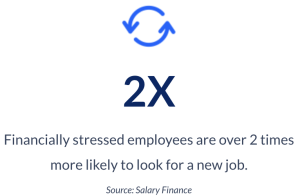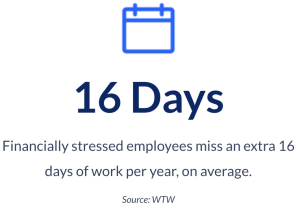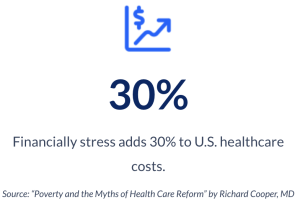Regular readers of TLNT will recall that recently, we featured the rise of a relatively new benefit: Earned Wage Access, or EWA.
EWA gives employers the opportunity to offer staff access to the wages they’ve already earned that week/month – in the form of an advance – rather than have them wait till pay day (which for 10% of Americans is still on a monthly basis).
With 70% of Americans now claiming to be stressed about their finances, it’s uncanny that an almost identical proportion (76%), now want their employers to offer it, meaning it’s a benefit that is suddenly very pertinent.
So, in our Q&A with Borja Perez, VP at CloudPay, we heard (from his perspective at least), why it is that more Americans would like to access it, as means of tiding them over, or meeting an unexpected cost that they hadn’t budgeted for.
But against this very clear benefit that EWA provides, the single-biggest criticism of it however, is that – at best – it’s a sticking plaster over people’s financial woes, and at worst, a crutch that will then be used time and time again. When this happens, claim critics, it actually worsens people’s ability to manage their finances, and eventually gets them into more and more debt.
So instead of falling head over heels for EWA, should CHROs/rewards heads actually be much more suspicious of it?
One critic, Tom Spann, co-founder and CEO of financial wellbeing Brightside, thinks it should.
But given that Brightside also offers financial solutions to hard pressed workers – including those in the form of low interest loans and other help; why does he think EWA is such a bad idea?
To find out, we decided to sit down with him, and find out why:
Q: So, we’ve all heard the so-called benefits of EWA – but why don’t you think they are as good as some people claim?
A: “To a very large extent, I think EWA is ‘pain relief.’ In some limited cases, it’s arguably worth the $4 charge, especially if it enables staff to get that emergency $100 they need to fill up their car literally help them get to work. But, and here’s my point, if you make money easy to access through EWA, it becomes addictive, and what’s more, it means the employer has no incentive to get that person using it into real financial health. From what we see, there is no evidence that the financial health of people using EWA actually improves. In fact, I’ve seen the pitches that EWA providers make to investors, where they specifically say they see loads of repeat use.”
Q: But isn’t EWA simply a useful ‘option’ employer can offer as part of a package of choices? And can’t employers set the rules of how much they can take out?
A: “Yes, having options is essential, because other solutions –things like payday loans – are much worse. And yes, we all know money is tight. Some 60% of Americans will suffer a financial shock of some description or another. But I think CHROs have a build a better approach. They have to ask whether EWA is the best option an employee can take, or whether there are better options out there. You have to remember, that most earned wage access amounts don’t actually grant that much, especially if the percentage levels employees are allowed to take is properly controlled. It certainly won’t be enough to cover most significant emergencies. These typically cost much more than a few hundred dollars to sort out. I would urge, at the very minimum, for more employer control, and for more communication between them and employees, to say that there are other options out there.”
Q: What other options are there?
A: “I do think there are better, and lower cost options employers can look at – such as low cost loans, or financial education programs – especially if they’re solutions that allow workers to take advantage of ‘teachable moments’ – where employees learn, for example, how better to save.”
Q: And you most definitely mean EWA shouldn’t be delegated to payroll, but should stay part of HR?
A: “Yes, absolutely. EWA is something that should not belong to payroll. They can administer it, fine. But a product used like this, without proper support, will – in my opinion – be detrimental to employees’ financial health. Payroll aren’t as interested in the impact on staff. To me, any financial help product needs to be rooted in understanding how people – ie workers – behave, and this is definitely something that lies at the door of HR. I just think HR is in more of a position to look at things holistically.”
Q: Do you think HR is being too easily swayed to offer it, because it’s seen as an easy way for them to provide financial wellbeing, and is meeting what seems to be a growing employee need?
A: “It’s definitely possible. The problem with this debate, is that everyone will have a different ‘correct’ answer. A holistic view is what’s needed. Brightside can – for instance – help reduce a person’s student loan payments by $200 a month – so in theory that negates the need to have to take $100 through EWA. This is what I mean by HR needing to look at things more in the round. What we have to remember, is that those people raising their hands for EWA are financially sick, so employers need to ask what they need to do to help make them better.”
Q: Does EWA make people more financially sick?
A: “My view is that yes, it does. It’s not ‘free’ – even though it looks like it is. Regulators are now looking into it, so it may well be that government agrees with me too. I certainly think those providers that offer EWA should be more transparent about how they make their money.”
What the data says



